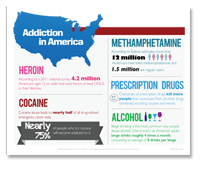Living with Mental Health Issues
You’ve no doubt heard the term “mental illness.” But what does it mean? A mental illness is a condition that impacts a person's thinking, feeling or mood and may affect his or her ability to function and to relate to others. Each person who suffers from mental illness will have different experiences – even people with the same diagnosis.
A mental health condition isn’t the result of one event. Genetics, environment and lifestyle can all play a part. Stress and traumatic life events can make some people more susceptible. Biochemical processes and brain structure may play a role too.
The good news is that recovery is possible, especially when you start treatment early and play a strong part in your own recovery process.
Know the Warning Signs
Trying to tell the difference between expected behaviors and what might be the signs of a mental illness isn't always easy. Each mental illness has its own set of symptoms, but some common signs of mental illness in adults and adolescents can include:
- Excessive worrying or fear
- Feeling excessively sad or low
- Confused thinking or problems concentrating and learning
- Extreme mood changes, including uncontrollable “highs” or feelings of euphoria
- Prolonged or strong feelings of irritability or anger
- Avoiding friends and social activities
- Changes in sleeping habits, feeling tired or lacking energy
- Changes in eating habits, such as increased hunger or lack of appetite
Mental Health and Substance Abuse
Substance abuse rates are higher among people with mental health conditions. Many medications commonly prescribed for mental health conditions can have a combined effect with drugs and alcohol that creates dangerous situations for users. Abusing drugs and alcohol may seem like an effective way to cope, but they can actually make a condition worse.
Getting a Diagnosis
There’s no medical test that can provide a diagnosis of mental illness. A health care professional can do a number of things to rule out any underlying medical conditions that may be causing symptoms.
You might be referred to a mental health professional who will use the “Diagnostic and Statistical Manual of Mental Disorders, Fifth Edition” (DSM-5) to make a diagnosis. The DSM-5, published by the American Psychiatric Association, provides clear definitions of mental disorders.
Upon receiving a diagnosis, you may feel a number of different emotions. You may feel relief at having a name for the things bothering you or fear and anger that you have an illness. You might not want to accept it. Getting a diagnosis, however, is an important step in receiving effective treatment and improving your quality of life.
Finding Treatment
There’s no “one size fits all” treatment – treatments vary by diagnosis and by person. Options can include medication, counseling, social support and education.
Every day, people overcome the challenges of mental illness to do the things they enjoy. By developing and following a treatment plan, you can dramatically reduce many of your symptoms. People with mental health conditions can and do pursue higher education, have successful careers, form lasting friendships and have fulfilling relationships. Mental illness can slow you down, but it doesn’t have to stop you.

